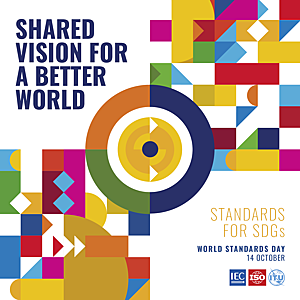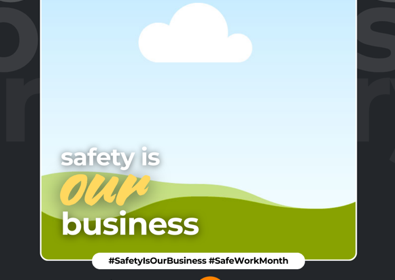World Standards Day 2024: Celebrating Standards for Sustainability

World Standards Day 2024: Celebrating Standards for Sustainability
Every year on October 14th, the world comes together to celebrate World Standards Day, a day dedicated to honouring the experts who develop international standards and recognising the importance of these standards in shaping a better, more interconnected world.
Why Standards Matter
Standards are essential tools that ensure consistency, safety, and efficiency across industries. From ensuring the safety of the food we eat to the technology that powers our lives, standards touch every aspect of our modern world. They enable products, services, and systems to work seamlessly together, regardless of where they are produced or used.
In today’s globalised economy, where products and services cross international borders daily, having a unified set of standards ensures interoperability and quality. Standards reduce costs, prevent unnecessary duplication, and foster innovation by providing clear guidelines for industry practices.
The 2024 spotlight – Sustainable Development Goal 9 (SDG 9)
In the face of climate change, resource depletion, and rising global inequalities, sustainability has become one of the most pressing challenges of our time. The spotlight for 2024 is Sustainable Development Goal 9 (SDG 9), one of the 17 United Nations Sustainable Development Goals, focuses on building resilient infrastructure, promoting inclusive and sustainable industrialization, and fostering innovation. This goal is central to creating sustainable economic growth, enhancing human well-being, and addressing global challenges like poverty, inequality, and environmental degradation.
Some of the key areas where standards drive sustainability include:
- Renewable Energy: International standards guide the development and deployment of clean energy technologies like solar, wind, and hydroelectric power. By providing technical specifications and safety guidelines, standards ensure that renewable energy solutions are reliable, efficient, and scalable.
- Energy Efficiency: From household appliances to large industrial equipment, standards help improve energy efficiency, leading to reduced energy consumption and a lower carbon footprint. Energy-saving standards empower consumers and businesses alike to make environmentally conscious choices.
- Sustainable Construction: Standards are crucial in promoting sustainable building practices, from using environmentally friendly materials to designing energy-efficient structures. These standards help reduce the environmental impact of construction, an industry traditionally associated with high levels of resource consumption and waste.
- Circular Economy: By supporting resource-efficient production processes and waste management practices, standards enable industries to adopt circular economy models where products are designed for reuse, repair, or recycling. This shift helps minimise waste and keeps materials in circulation for longer.
The Role of Standards in Achieving the UN Sustainable Development Goals (SDGs)
The United Nations Sustainable Development Goals (SDGs), established in 2015, set out a blueprint for achieving a better and more sustainable future by 2030. Standards play a crucial role in meeting these goals by providing the framework for sustainable practices across industries.
The Three Pillars of SDG 9:
- Resilient Infrastructure
- Sustainable Industrialization
- Fostering Innovation
- Building Resilient Infrastructure
Infrastructure is the backbone of every modern economy. Roads, bridges, energy grids, water systems, and telecommunications networks are critical for the functioning of societies and economies. SDG 9 calls for the development of high-quality, reliable, and resilient infrastructure that can withstand environmental, economic, and social shocks.
- Promoting Inclusive and Sustainable Industrialization
Industrialisation has historically been a key driver of economic growth and development. However, it has often been associated with environmental degradation and social inequalities. SDG 9 emphasizes the need for sustainable industrialisation that supports economic growth while being environmentally responsible and socially inclusive.
- Fostering Innovation
Innovation is essential for addressing the world’s most pressing challenges—from climate change and health crises to energy and food security. SDG 9 encourages investments in research and development (R&D), technological advancements, and innovations that can drive economic development while also supporting environmental sustainability.
How to Contribute to SDG 9:
- Businesses: Adopt sustainable industrial practices, reduce emissions, and innovate in ways that contribute to both economic growth and environmental sustainability.
- Individuals: Support policies and companies that prioritize sustainability and advocate for innovation that addresses social and environmental challenges.
The Collaborative Nature of Standards Development
Standards don’t just appear out of thin air—they are the result of collaboration between technical experts, industry leaders, governments, and international organisations. Bodies such as the International Organisation for Standardisation (ISO), International Electrotechnical Commission (IEC), and International Telecommunication Union (ITU) work together to develop and promote standards that benefit industries and consumers alike.
These organisations engage stakeholders from around the world to ensure that the standards they create reflect global needs and are applicable in diverse contexts. This collaboration makes standards an essential tool for levelling the playing field between developed and developing nations, ensuring that innovation, sustainability, and safety are accessible to everyone.
How You Can Get Involved in World Standards Day 2024
There are many ways individuals, businesses, and organisations can participate in World Standards Day:
- Raise Awareness: Use social media platforms to share information about the importance of standards and how they contribute to sustainability. Spread the word using the hashtag #WorldStandardsDay.
- Host Educational Workshops: Organise workshops or webinars to educate employees, students, or the public about the role of standards in sustainable practices and how they can be implemented in everyday life.
- Collaborate on Sustainability Projects: Businesses can partner with standards organisations or other companies to develop new, more sustainable products or improve existing processes.
- Participate in Events: Many countries and standards bodies host events to celebrate World Standards Day, such as seminars, panel discussions, and technical exhibitions. Participating in these events offers opportunities to learn more about the impact of standards on industries and society.
Final Thoughts
As the world faces complex global challenges like climate change, environmental degradation, and inequality, standards offer a practical, proven way to address these issues. World Standards Day 2024 reminds us that sustainability is not just a goal but an ongoing process—and international standards are the foundation upon which we can build a more sustainable, fairer world.
SDG 9—focusing on Industry, Innovation, and Infrastructure—is fundamental to achieving a sustainable and inclusive global economy. By building resilient infrastructure, promoting sustainable industries, and investing in innovation, we can create a future where economic growth benefits all while preserving the planet for future generations. As we continue to work towards the United Nations’ 2030 Agenda, SDG 9 serves as a critical lever for progress, helping to drive positive changes across all aspects of sustainable development.
Whether through renewable energy, efficient production methods, or sustainable construction practices, standards pave the way for long-term solutions that benefit not only industries but also society as a whole. In celebrating World Standards Day, we acknowledge the critical role standards play in ensuring that sustainability is woven into the fabric of modern life.

Call to Action
Talk to our team today about how we can help with your Standards compliance requirements – Call us on 1300 706 491 or email info@auditco.com.au.

